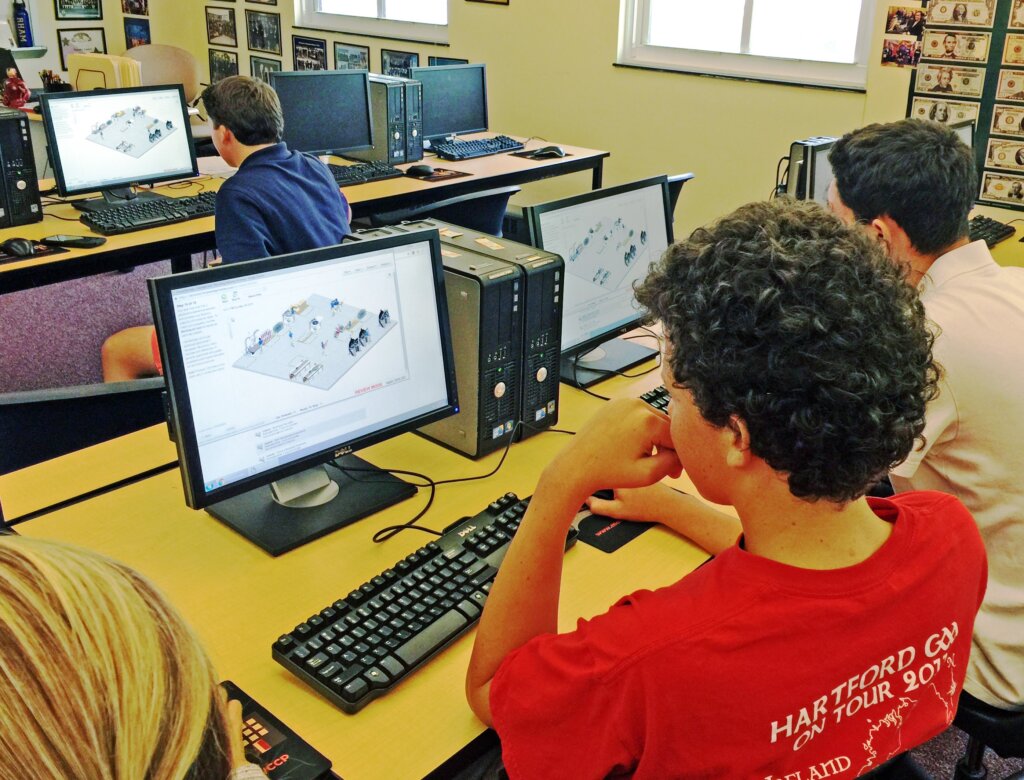CT HS Teacher Integrates Knowledge Matters’ Business Simulations Into Business Classes

Tim Landry, a teacher at RHAM High School, in Hebron, CT, has been teaching high school business classes for 17 years. Landry has also taught as an adjunct at Eastern Connecticut State University for the past nine years. Landry mostly teaches high school juniors and seniors with a few sophomores each year.
Landry currently uses Knowledge Matters’ Virtual Business – Retailing and Virtual Business – Sports & Entertainment for two sections of Marketing Principles (45 students), and Virtual Business – Management and Virtual Business – Restaurant for two sections of Management Principles (45 students). And, given his success with using business simulations with his students, Landry just received a grant to add Virtual Business – Accounting to two sections of Financial Accounting (40 students) that he’s teaching.
Landry has tightly integrated Knowledge Matters’ business simulations into his classroom curriculum. He uses the business sims’ lessons to supplement course textbooks or other resources.
“For example, in my Management Principles class, we are entering a unit on job exploration and resume/cover letter development. All the students will be developing both a cover letter and resume for this class,” Landry said. “I had students start this unit by completing the Virtual Business – Management Lesson 1 activity: Recruiting, Resumes and Hiring. This served as a strong introduction which I extended with an additional day of class time. From that point, we were able to get students to begin resume development but with a clearer perspective on how a strong resume can lead to more interview opportunities and potential hiring options.”
Landry’s students enjoy the self-guided approach of Knowledge Matters’ business simulations.
“Many students are eager to redo the sim activity and learn from their strategic errors.”

As a teacher, Landry cites multiple benefits to Knowledge Matters’ business simulations:
“The relevant content is self-contained and easy to present to students. It is a logical inclusion for days that I have field trips or are out of the building. I will strategically use these lessons for days I know in advance that I will be absent.”
“The assessments are easy to prepare and present to students. I like that there are three measurable assessment grades for each lesson and can thus provide significant feedback to student participants.”
Landry also encourages his students to participate in the DECA Virtual Business Challenges – annual competitions run by Knowledge Matters in conjunction with DECA.
“I introduce the DECA challenges in class, hold after school workshops and allow student to experiment/choose which sim platforms they are most interested in,” Landry said.
Landry sees some students become fully immersed in the intricacies of running a profitable business within the business sims.
“Students can become “addicted” to the sim, especially with the multi-player or turnaround activities where you control all elements of running a business enterprise or the DECA Virtual Business Challenges,” Landry said. “I have students who truly engage in these above mentioned activities and put in 100s of hours within the designated timeline. For some students, these sims become amazingly powerful tools that challenge them to think creatively and utilize/manage all elements of the business.”
In his 17 years as a teacher, Landry has honed his teaching skills. He works hard to build positive relationships with students by being a strategic, active listener with his students.
“I want to know about their day’s, experiences, successes and problems. I have a unique perspective to nurture student relationships as the DECA and school store advisor. Of course I demand respect, both in and out of the classroom, but work hard to develop and strengthen positive relationships with students which in many cases are maintained after high school graduation,” Landry said.
Landry’s own experiences as a high school student in the 1980s shaped his desire to teach business to high school students. One of Landry’s teachers stands out in his mind.
I always remember my “typing teacher” Ms. Jones. She was a strict, older woman who taught classes in proper typing technique (big old Smith Corona typewriters). Through constant repetition and cadence, we learned how to type accurately. I left the class typing 55 WPM with minimal errors. This skill has paid me dividends throughout my business and teaching career.”